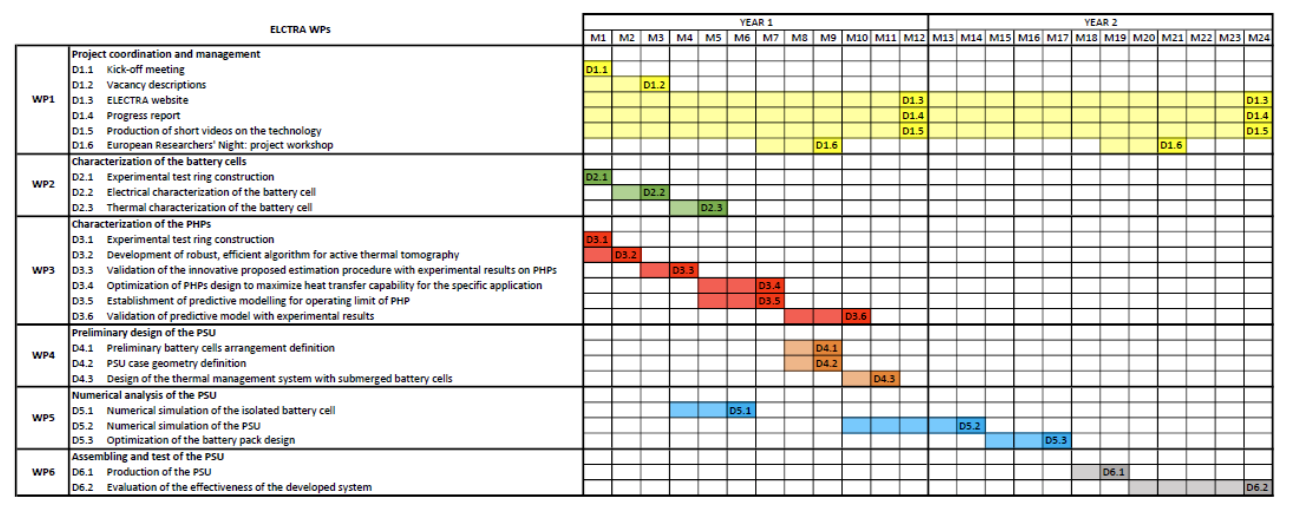ELECTRA: Enhanced Liquid cooling for ElectriC Traction systems in Recreational Aviation

The aim of this research project is to develop an innovative Power Supply Unit (PSU) for electric aircraft (EA) based on high efficiency thermal management system adopting two-phase fluids. Indeed, batteries in aircraft applications could be subjected to very stressful electric and environmental operating conditions. The PSU must be able to deliver high power that generates very high specific heat fluxes into the batteries with a consequent rapid increase of temperature that cause a sharp decrease in performance and lifetime. A solution to this problem may be the design and employment of an innovative Battery Thermal Management System (BTMS) with high efficiency. Nowadays, the aircrafts with Maximum Take-Off Mass (MTOM) lesser than 600 kg are widespread. In Italy these aircrafts are identified as “Apparecchi per il volo da diporto o sportivo (VDS)” but generally this category is named Light Sport Aircrafts (LSA). Our research project is devoted to this aircraft category and, in particular, in training LSA aircrafts requiring a limited flight time compatible with battery energy storage capability. In the proposed PSU the Li-Ion cells are submerged in a low boiling dielectric fluid (hereinafter main fluid) that allows an efficient heat transfer. The dielectric fluid transfers the heat generated by the battery to the enclosing frame which, in turn, dissipates it through the surrounding environment. Furthermore, Pulsating Heat Pipes (PHPs) are partially enclosed in the cells pack and they are submerged in the main fluid. The PHP device belongs to the category of passive two-phase capillary driven loops. From a technological point of view, a PHP is very simple and cost effective compared to other heat transport devices. Moreover, their compactness, flexibility, ability to work without an electrical energy input and the versatility to work in microgravity make them perfect for aircraft applications where size, weight and inertial forces values are crucial variables. The role of the PHPs implementation in the cooling system is to mainly dispose of thermal power peaks when the excessive load risks causing all the dielectric fluid to evaporate, thus producing a subsequent overheating of the gas phase and a consequent increase in pressure dangerous to the safety of the device. The PHPs will be specifically designed to support the heat transfer by the dielectric fluid before and during phase change. A combined numerical and experimental approach based on high-resolution/speed IR camera, CFD and inverse heat conduction problem solution techniques will be used to identify the local temperatures and heat fluxes. This will allow to optimize electric power unit for maximizing thermal performance.
Full Description of the Project
-
Lead Partner: Università Politecnica delle Marche
Associated Investigator: Prof. Valerio D'Alessandro
email: v.dalessandro@univpm.it
-
Partner n°2: Università degli Studi di Parma
Associated Investigator: Prof. Luca Cattani
email: luca.cattani1@unipr.it
-
Partner n°3: Università "G. d'Annunzio" di Chieti-Pescara
Associated Investigator: Prof. Sergio Montelpare
email: sergio.montelpare@unich.it
- WP1: PROJECT COORDINATION AND MANAGEMENT
Coord. UNIVPM
This WP will enable an efficient management of the research project in relation to all the activities carried out by the different research units thus ensuring the integration of skills and resources in order to reach the targeted global project result. To this aim UNIVPM will coordinate the activities between the research units, organize kick-off, intermediate and final meetings, monitor and verify the progress of the activities, prepare the annual technical reports, and share the results with the scientific community. UNIVPM will organize an end project open workshop that will serve as routes to immediate dissemination of the activities within and outside the network. - WP2: CHARACTERIZATION OF THE BATTERY CELLS
Coord. UNIVPM
The first part of the research involves the identification of electrical loads for batteries. They will be defined according to the specific application and actual operating conditions of cells. Experimental tests will aim to simulate real operative conditions of Li-Ion cells adopted for the application of interest. With this task it is our intention to evaluate the thermal behaviour of the adopted PSU. On the other hand, the experimental test rig will involve the use of thermal sensors and infrared thermography to measure the thermal flux generated and thermal pattern of the battery. - WP3: CHARACTERIZATION OF THE PHPS
Coord. UNIPR
The first experiments will be carried out on a multiple loop PHP that is fully compatible with the restrains of the specific applications found in WP2. These preliminary tests will clarify the local behaviour at the liquid-vapor transport limit by visualization with a high-speed, high-resolution IR camera. The PHP will be tested with different working fluids.
It will be estimated the local heat flux from the wall to the working fluid over time and space inside the pipes by solving the inverse heat conduction problem in the wall adopting experimental temperature data. The approach is based on advanced data processing methods (i.e., data filtering, and the Tikhonov regularization method) applied to temperature maps obtained with an IR thermographic system.
The second set of experiments will be carried out on different PHPs that will be manufactured considering the results of the previous experimental campaign. In particular, they will be tested the parameters that have a large effect on the operating limits, namely, tube diameter, number of turns and wettability.
Finally, by the results of the experimental campaigns, it will be developed a predictive model of the PHP behaviour built for the specific applications. It will predict the heat flux and operating temperature. - WP4: PRELIMINARY DESIGN OF THE PSU
Coord. UNIVPM/UNIPR
This WP consists in the design of the battery pack that will be submerged in a low boiling dielectric fluid. The first aspect to consider is the available volume for the specific application. This element will limit the degrees of freedom for: (a) the size and shape of the external frame; (b) the arrangement of the batteries inside the frame itself. Then, the design of the PHPs will be performed to enhance the heat transfer from the inner parts of the PSU to the environment. One of the principal aims of the PHPs implementation in the cooling system is to dispose of thermal power peaks when the excessive load risks causing all the dielectric fluid to evaporate, thus producing a subsequent overheating of the gas phase and a consequent increase in pressure dangerous to the safety of the device. - WP5: NUMERICAL ANALYSIS OF THE PSU
Coord. UNICH
Firstly, the numerical approach will be tested and validated on single Li-Ion cell. Specifically, experimental electrical performance data, carried out by WP1, will be used to obtain cell temperature field over the time and verify numerical results.
The same approach will be adopted to achieve a proper arrangement of the cells and of the PHPs inside the PSU. It will also be crucial to study the transient behaviour of heat transfer from the cells to the frame; in this condition it is also very important to identify the phase lag between the required electric load and the heat generation. A preliminary identification of the critical zones will be obtained with the above described analysis.Therefore, the numerical results allow to realize a cooling system capable of balancing temperature distribution inside the battery package. - WP6: ASSEMBLING AND TEST OF THE PSU
Coord. UNIVPM/UNIPR
The PSU frame will be assembled using compatible materials with the dielectric fluid. Experimental tests will be carried out to evaluate their thermal performance when subjected to external electrical loads. It is important to put evidence that PSU electrical tests will be performed at MIDAC Batteries laboratory (Soave -Verona, Italy). This element will allow to test a full scale PSU prototype. Wind tunnel tests will be also performed on a scale PSU in order to verify the cooling system effectiveness.
The deliverables of each WP are here identified, and their timing is reported in the attached scheme.

- UNIVPM: € 76.800,00
- UNIPR: € 75.801,00
- UNICH: € 32.067,00
- TOT: € 184.668,00
- Project Start Date: 04/02/2025
- Project End Date: 04/02/2027
Scopri cosa vuol dire essere dell'Ud'A
SEDE DI CHIETI
Via dei Vestini,31
Centralino 0871.3551
SEDE DI PESCARA
Viale Pindaro,42
Centralino 085.45371
email: info@unich.it
PEC: ateneo@pec.unich.it
Partita IVA 01335970693



